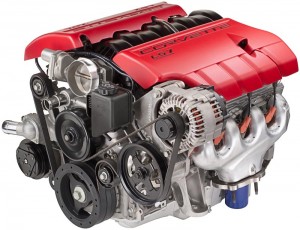The automobile stands as an enduring symbol of mobility and opportunity in America — and of innovation that’s at the core of our nation’s economic strength and prosperity.
Yet the conventional gasoline-powered engine is sometimes disparaged and treated as if it’s yesterday’s technology. Listening to politicians, environmentalists and media pundits, you might think that the gas engine is inefficient and old-fashioned, a relic of the past that ought to be replaced by alternative automotive technologies like electric cars and plug-in hybrids.
But a good look at the latest advances in the gasoline-powered engine — and those on the horizon — jars this opinion, and the surge in U.S. oil production from shale drilling further refutes the idea that conventional engines are old technology.
Already powering more than 230 million cars in the United States, internal combustion engines have the potential to become substantially more efficient, while providing economic and environmental benefits that extend well beyond the money consumers save at the pump.
Imagine if your car uses advanced computing to control fuel injection far more precisely than before, improving the fuel efficiency of big cars by more than 15 percent. Or what if your car is able to knock another 30 percent off fuel consumption — and corresponding greenhouse-gas emissions — by partly cooling hot exhaust gas before it is pumped into the engine?
Diesel engines, which are more efficient than gasoline engines, might also take off in the U.S. Half of the cars in Europe are diesel-powered. Diesel engines convert 45 percent of the fuel’s chemical energy into mechanical work, compared to only 30 percent for gasoline engines. With federal fuel-economy standards getting tougher by 35 percent over the next five years, auto manufacturers recognize that the efficiency of the internal combustion engine must improve dramatically.
Auto companies are pinning their hopes on technologies like advanced gasoline direct injection and cooled exhaust gas recirculation that make engines of traditional cars and trucks more efficient — and they want it done in the near term. They are also counting on advances in high-tech materials and automobile design to allow them to build lighter cars and small trucks without sacrificing safety. Because lighter vehicles use less fuel, this leads to much-improved fuel economy.
Don’t expect all of these technological advances in next year’s models, but automakers expect to hit their fuel economy targets over the next decade, rising from about 32 miles-per-gallon today to about 51 by 2025. Importantly, they are achieving technological breakthroughs with the internal combustion engine on their own, without the government subsidies that support the development of electric vehicles. For now, the most cost-effective technology changes in the near term are improvements in conventional cars — advanced internal combustion engines and diesel engines — that will reduce our energy consumption and enhance energy security.
Another issue that’s very important: As economics students know, switching technologies involves costs, and the verdict on the economic desirability of the switch to hybrids and electric cars is still out. Hybrids and electric cars use rare earth metals in their batteries and in the systems that propel the cars. China accounts for more than 90 percent of the world’s supply of these exotic, rare earth metals. Three years ago, in retaliation for the arrest of a Chinese fishing boat captain, China retaliated by blocking the shipment of rare earth metals destined for Japan. Some questions arise:
Are we substituting a new set of security risks for the old ones involving OPEC oil? Would a major shift to hybrids and electric cars leave the United States less dependent on foreign oil but vulnerable to foreign control of rare earth metals?
The U.S. Energy Information Administration forecasts that even in 2035, more than 99 percent of cars and trucks sold will still have internal combustion engines. With advanced engine technologies, the potential fuel savings will be huge.
Access to more fuel-efficient cars is not only vital to the functioning of the larger U.S. economy, it is vital to people’s everyday lives. It also significantly impacts America’s energy security, environmental well-being and economic competitiveness.
Success with fuel-efficient cars using conventional engines, both gasoline and diesel, will open up vast new markets and add high-paying jobs in auto manufacturing. And it will preserve America’s leadership in automotive technology, while making our world cleaner and more secure.
. . . . . . . . . .
Mark J. Perry is an economics professor at the University of Michigan–Flint and an American Enterprise Institute scholar. This article was orginally published at the Detroit News.
From The Detroit News: http://www.detroitnews.com/article/20130614/OPINION01/306140001#ixzz2YTGXESC6

